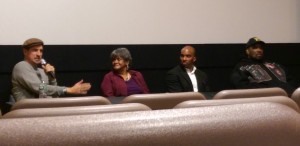Last Monday, I got the opportunity to see a screening of the documentary Rubble Kings. Before the film started, Mayor Svante Myrick dedicated October 26th in Ithaca to honor Afrika Bambaataa who has made global cultural contributions as well as his donations to Cornell’s Library Hip Hop Collection. I didn’t even know we had one, but I’m sure tour guides will point out that Cornell now houses one of the largest collections of historical hip hop music.
The documentary itself revealed lots of information I had no prior exposure to. Before, when I thought of gangs in New York, I thought of Leonarda DiCaprio and Daniel Day-Lewis in the 19th century. This documentary started off by explaining the gang situation in the 20th century and how apathy for people living in especially the Bronx led to gang rule of the area. It was crazy to hear about so many different gangs. It would seem like if there were that many, you couldn’t really go anywhere too far from your front door without getting beat up because of the name you wore on your back. What was interesting that I also didn’t know was that there typically weren’t Puerto Ricans and Black people in the same gang.
The style of the documentary was unique. When prior gang members talked about stories that were undocumented, comic-styled depictions were interlaced. Speaking of documentation, I was very surprised by the amount of documentation there was of gang activity. In one scene, a gang was beating up someone from another gang and the camera was just a few yards away from the violence, held steadily. There were also videos of the gangs messing with rubble and initiating new members. It really made me wonder why they were doing this. Why were they filming their gang activity?
Another seemingly odd thing they did was make music. The Ghetto Brothers made an album and I realized just how much they were being ignored by the rest of society. The gangs were clearly dominant in the area and were well known among their own community that the leaders of one could release a music album. I would think this would be a perfect lead for police looking into gang activity, but they clearly didn’t bother to deal with the neighborhoods. Also, it was interesting to think about how they could afford to do all of this. It seems like they spent all of their time fighting against each other, that I don’t know how they could afford their jean jackets and recording equipment. While the film showed a lot, I still have unanswered questions.
The Ghetto Brothers became focused on peace and community activism; so after their peace counselor was killed, they gathered a meeting to put an end to the gang violence, because it had gone too far. Quickly, the gangs shed their borders and people across the Bronx intermingled and hip hop was born. It was interesting to see how the death of one, clearly influential community figure, changed the culture of an area. The gang-riddled areas just became a place of shared creativity and a new culture was created.
After the documentary, there was a panel open to audience questions.
The panelists were Shan Nicolson, the director, Lorraine Montenegro, of United Bronx Parents, Luvelle Brown, the Ithaca District superintendent, and Afrika Bambaataa. The panel really brought out the different personalities of the panelists. The director was clearly interested in the film’s content, talking about how he personally came to learn about the origins of hip hop. Lorraine was clearly a strong female who had accomplished much to help the lives of many. She had worked with many kids from the ghetto and was always a believer that “there ain’t nothing you can’t do.” The superintendent seemed like an odd choice for a panelist, but he brought his own experiences growing up in rural Virginia and compared them to similarities with gang violence in the documentary. He also made some jokes after reassuring the audience that his statements were in no way a reflection of Ithaca’s schools. Afrika Bambaataa was also a very interesting speaker. He talked multiple times about his strong belief in factology – about the real facts behind everything. I vaguely remember him saying (correct me if I’m wrong) that saying Columbus discovered America would be like if he walked into your house and said that he discovered it. He was clearly a man who thought long and hard about many different aspects of our world, and I’m glad Cornell invited him to be a visiting scholar.
Overall, factology was the point of the documentary – to get an important story out there. I’m sure many of us learned about the Harlem Renaissance and its cultural significance, but hip hop culture seems to be not as relevant or worthy of scholar study, despite its rich and interesting history. The director said that there was still more to be told, and I would definitely be interested in learning more about a story I didn’t know about more than a week ago.

